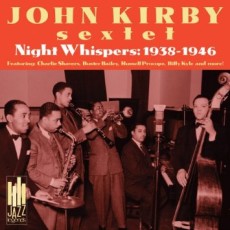
Daily Dose Of Jazz…
John Kirby was born John Kirk in Winchester, Virginia on December 31, 1908. His mother gave him up for adoption and was raised by Reverend Washington and Nancy Johnson. He was a student at the Winchester Colored School and started trombone lessons around nine years old under the guidance of Professor Powell Gibson. As a kid and that he learned to play music just as it was written and his formal education ended around 1923.
Kirby arrived in Baltimore around 1927 and met trombonist Jimmy Harrison, saxophonist Coleman Hawkins and composer Duke Ellington. It was Harrison who persuaded him to switch from trombone to tuba. He played tuba with Bill Brown and His Brownies, pianist Charlie Sheets and then with John C. Smith’s Society Band. He joined Fletcher Henderson in 1929, recorded tuba on a number of sessions, but switched to double-bass when tuba fell out of favor as jazz bands’ primary bass instrument.
In the early 1930s, John took bass lessons from legendary bassists Pops Foster and Wellman Braud, left Henderson to play with Chick Webb, then joined Lucky Millinder and briefly led a quartet in 1935, but was more often than not a sideman in other groups. He performed behind Billie Holiday and Teddy Wilson on their first recording date.
By 1936, Kirby was a successful sideman on the New York City jazz scene, secured a gig at the Onyx Club leading Charlie Shavers, Buster Bailey, Billy Kyle, Russell Procope and O’Neill Spencer, becoming one of the more significant small groups in the big band era. They recorded the Shaver’s classic Undecided, with Maxine Sullivan most often performing the vocal duties for the group.
Along with his orchestra, John had a 30-minute radio program, Flow Gently, Sweet Rhythm, also known as The John Kirby Show on CBS from April 1940 – January 1941. The program also featured Sullivan and the Golden Gate Quartet and they have been cited as the first black artists to host a jazz-oriented series.
He tended toward a lighter, classically influenced style of jazz often referred to as chamber jazz. He was very prolific and extremely popular from 1938-1941 but lost most of his group to World War II. Through the war years he was able to attract Dizzy Gillespie, Benny Carter, Ben Webster, Clyde Hart, Budd Johnson and Zutty Singleton to his small groups and club dates. As Kirby’s career declined, he drank heavily and was beset by diabetes.
After the war, Kirby got the surviving sextet members back together, with vocalist Sarah Vaughan but the reunion did not last. A concert at Carnegie Hall in December 1950, with Bailey plus drummer Sid Catlett, attracted only a small audience, crushing his spirit and badly damaging what little was left of his career. Double-bassist, trombonist and tubist John Kirby passed away on June 14, 1952 in Hollywood, California at age 43.
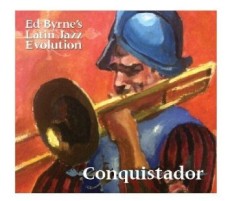
Daily Dose Of Jazz…
Ed Byrne was born on December 30, 1946 in Philadelphia, Pennsylvania and he worked for more than fifteen years on the New York City jazz scene as a soloist with Chet Baker, Joe Henderson, Herbie Hancock, Dizzy Gillespie, Maynard Ferguson, Billy Eckstine, Charles Mingus, Gerry Mulligan, Thad Jones/Mel Lewis, Archie Shepp, Mel Torme and the list continues. He also performed, composed, and arranged numerous recordings and toured the Americas, France, Germany and Sweden.
Ed was nominated Best Trombone Soloist by Latin New York magazine, as a leader was nominated for a Grammy Award for his Fenway Funk album, and won a Grammy for Eddie Palmieri’s Latin jazz album, Unfinished Masterpiece.
As an educator he hold a doctorate of Musical Arts in Jazz Studies from the New England Conservatory, has been on the faculties of Berklee College, Baruch College, University of the Arts, Greenfield Community College and the University of Rhode Island. Ed has published 42 texts on jazz improvisation and his Linear Jazz Improvisation Method, sold world-wide.
Trombonist, author, bandleader, composer, arranger and educator Ed Byrne is currently the leader of his Latin Jazz Evolution that released their first CD titled Conquistador, on Blue Truffle Records and continues to perform, record and tour.
More Posts: trombone
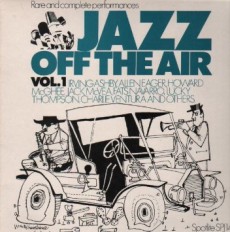
Daily Dose Of Jazz…
Irving C. Ashby was born December 29, 1920 in Somerville, Massachusetts. After playing rhythm guitar in Lionel Hampton’s orchestra, he played in the Nat King Cole Trio from 1947 to 1951. He then briefly replaced drummer Charlie Smith in the Oscar Trio, producing a lineup of piano, guitar and bass similar to the Cole Trio’s, a substitution that continued until 1958.
After leaving the Peterson Trio, Ashby concentrated on session work for the labels. His subsequent recordings included sessions with Norman Granz, Sheb Wooley, LaVern Baker, Howard Roberts, B.B. King, Louis Jordan, Pat Boone and Illinois Jacquet.
In addition to performing on guitar, Irving Ashby also played the upright bass until his passing on April 22, 1987 in Perris, California at the age of 66.
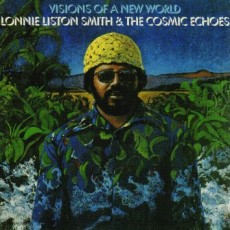
Daily Dose Of Jazz…
Lonnie Liston Smith, Jr. was born into a musical family on December 28, 1940 in Richmond, Virginia. With his father a member of Richmond Gospel music group The Harmonizing Four, as a child he was privy to groups such as the Swan Silvertones and the Soul Stirrers with a young Sam Cooke at his house. He learned piano, tuba and trumpet in high school and college, graduating from Morgan State University in Baltimore, Maryland with a degree in music education.
Influenced by Charlie Parker, John Coltrane and Miles Davis, while still a teenager at college, Smith became well known locally as a backing vocalist and pianist. He played the Baltimore area with Gary Bartz, Grachan Moncur, Mickey Bass, backed Betty Carter and Ethel Ennis and played in the house band at the Royal Theatre.
1963 saw him moving to New York, once again with Carter for a year followed by Rahsaan Roland Kirk and recording Here Comes The Whistleman. After this stint with Kirk he joined Art Blakey’s Jazz Messengers sharing the piano seat with Mike Nock and Keith Jarrett and then with Max Roach. He would go on to play with Pharoah Sanders improvising and pushing the creative boundaries of free jazz. It is at this point that Smith began experimenting with electric keyboards:
In 1969 Lonnie also backed Sanders vocalist Leon Thomas on his first album Spirits Known and Unknown, played with Gato Barbieri on The Third World, and with Miles Davis for On The Corner. He formed the Cosmic Echoes in 1973 with Cecil McBee, George Barron, Joe Beck, David Lee, James Mtume, Sonny Morgan, Badal Roy and Geeta Vashi. The group blended fusion, soul and funk on several recordings for Flying Dutchman Records over the next twelve years.
After the crossover success of the 1970s, he moved into the smooth jazz format, however, public interest slowly waned. By the mid-Eighties he returned to his acoustic roots with McBee and Al Foster recording a session of standards for Bob Thiele’s Startrak label. But dealing with the labels bottom line he returned to smooth jazz working with Phyllis Hyman and Stanley Turrentine. He also delved into hip-hop working with rapper Guru on his groundbreaking Jazzmatazz, Vol. 1. Pianist and keyboardist Lonnie Liston Smith established his own label Loveland, gathered greater recognition with Sony International distributing his Cosmic Echoes years, and has since continued to compose, record and tour to festivals worldwide.
More Posts: piano
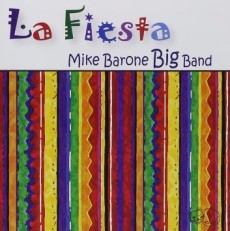
Daily Dose Of Jazz…
Mike Barone was born on December 27, 1936 in Detroit, Michigan. He started playing the trombone at age 12 and was taught by his trumpeter father Joe Barone, who played with the Bob Crosby Orchestra and other big bands. He graduated from Brush High School in Cleveland, Ohio in 1954 and studied trombone, guitar and arranging until 1956 until his acceptance into the West Point Army band studying with Louis Van Haney of the New York Philharmonic Orchestra. After graduation he was stationed in Germany with the Special Services and formed his first jazz big band touring service clubs.
By 1959 Mike was back in California attending Valley College but left to tour with Sy Zentner and Louis Bellson Orchestra. He worked many years arranging, performing and recording with Louis and Pearl Bailey, recording with Lalo Schifrin’s New Continent and Dizzy Gillespie’s Quintet. He has performed with Dick Grove, Pete Jolly, Gabor Szabo, Oliver Nelson, Terry Gibbs, Gerald Wilson and many more. Twenty-seven of his arrangements have been recorded by Wilson and others, and the now classic Johnny Hartman album Unforgettable has 7 tunes were his arrangements.
He put together a quintet with Frank Rosolino, formed the Mike Barone Big Band, recorded with Bob Edmondson, John Williams and Shelly Manne, took session work for film including Harper, The Dirty Dozen, Kelly’s Heroes, Sweet Charity, Up the Down Staircase and The Thomas Crown Affair. On television he performed the theme Mission Impossible, Dynasty, Falcon Crest, The Grammys, The Midnight Special, Redd Foxx Show and the Johnny Carson Tonight Show among others.
Since 1997 Mike returned to Los Angeles, California after stints in Colorado and Vancouver, he formed a new band and performed at area clubs. Arranger, composer, trombonist Mike Barone, known for one of the best known West Coast big bands in the Sixties, continues to arrange, perform and tour.
<
More Posts: trombone


